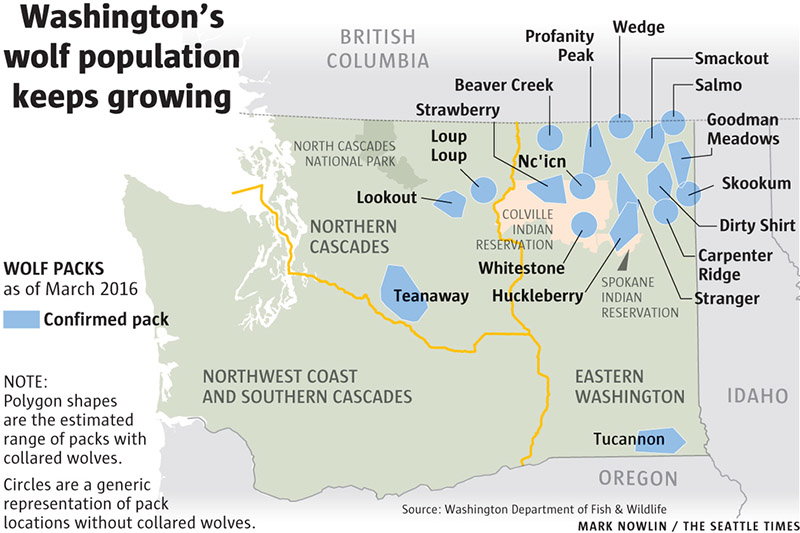By the time you read this, the Profanity Peak wolf pack in Washington State will be no more.
At last count, six wolves of the 11 member pack have been destroyed. All that remains is one adult and four cubs. And if the last remaining adult is killed, the cubs will most likely starve to death.
What’s left of the pack will either survive long enough to join another pack , or they won’t. Regardless, the Profanity Peak wolf pack is gone.
Washington State Proud
Washington State prides itself on not being the same as its neighbors to the east and north. It doesn’t immediately issue a shoot-to-kill order for endangered wolves when one head of cattle is killed or injured. No, Washington State has a Wolf Advisory Board. On this Board are wolf conservation groups, like Defenders of Wildlife, Humane Society of the United States, Conservation Northwest, and Wolf Haven International.
This Board has helped Washington State develop a protocol for when wolves are killed; a set of non-lethal actions that must be followed before the kill order is given.
The reality is, though, the wolves in the Profanity Peak pack are being killed. Just like the wolves are being killed in Idaho, Wyoming, Alaska, and other states. But we’re not supposed to feel outrage at such an action because Washington State has a Wolf Advisory Board, and it has guidelines.
The Animal Welfare Group Statement
Four of the animal welfare organizations on the Advisory Board issued a statement about the Profanity Peak wolves:
The authorized removal of wolves in the Profanity Peak wolf pack in northeast Washington is deeply regrettable. The Washington Department of Fish and Wildlife (WDFW) is, however, following the protocol developed by Washington State’s Wolf Advisory Group (WAG) – a diverse group of stakeholders. The WAG and WDFW have committed to evaluating how the protocol worked on the ground this season in order to improve it for next year. In addition, we intend to conduct a thorough and open-minded assessment of the issues raised by all stakeholders involved.
We remain steadfast that our important goals remain the long-term recovery and public acceptance of wolves in our state alongside thriving rural communities. In the meantime, we ask our community and the citizens of Washington State and beyond to engage in respectful and civil dialogue as we work through these challenging events. We believe that ultimately we can create conditions where everyone’s values are respected and the needs of wildlife, wildlife advocates, and rural communities are met.
The organizations don’t want us to be outraged. They want us to accept that “Eh, these things happen.” They want us to treat the destruction of an entire pack of endangered wolves as if it’s just another Sunday, and here’s a cookie. We’re to engage in a respectful and civil dialogue.
An entire pack of endangered wolves is being killed, and they want us to be respectful and civil?
OK, then. Let’s engage in a respectful and civil dialogue.
Grazing Permits and National Forests
The cattle are on public land in the Colville National Forest. They are on this land because the rancher has a grazing permit. His cattle join with approximately 32,000 or so other privately held cattle allowed to graze on public land in Washington State. Graze at a taxpayer-subsidized rate—grazing permit holders don’t pay full value for the true cost of grazing on public land.
The rancher is Len McIver, of the Diamond M Ranch. He’s a multi-generation rancher who uses grazing permits to raise his cattle. You might say, since grazing permits are subsidized, he’s the fourth generation rancher benefiting from taxpayer support. A common term used for this type of rancher is “welfare rancher”.
Oh. I’m sorry. Was that not respectful? I’ll try to do better.
The Diamond M Ranch Connection
This isn’t the first time Len McIrvin has been involved in the destruction of a wolf pack. In 2012, it was his cattle that led to the decision to kill off the Wedge wolf pack, in the same area as the profanity Peak pack. In a 2012 interview, his son, Bill McIrvin, claimed that wolves are the worst predator:
Bill tells me that the first confirmed wolf kill on the Diamond M was in 2007, and probably from the same pack accused of livestock depredation now, the Wedge pack. When I ask about other predators, Bill says lots of predators go after their cattle, including black bear and cougar, although he is unable to tell me how many cattle succumb to these animals yearly. But wolves, he says, are the worse. Why? I ask. Because they are killing but not eating–for fun, not merely for food, he responds.
Wolves kill for fun. It’s an odd thing, but of all the reasons given why wolves kill, not one wolf expert has stated that wolves kill for fun.
One could say that Bill McIrvin is a lying sack of cow poop if one wasn’t attempting to remain civil.
The Anti-Wolf Message
What’s interesting about Bill and Len McIrvin is how dedicated they’ve been about spreading the message that wolves are killers, wolves and cattle don’t mix, and how all wolves need to be killed. I contrast this with the assurances we’ve been given that any and all non-lethal measures were taken, first, by these same individuals before the decision was made to kill both Wedge pack in 20012, and the Profanity Peak pack this month.
I hope I won’t seem disrespectful if I happen to believe that two people passionate about removing wolves won’t do everything in their power to ensure wolves can remain.
Evidently, the McIrvins do support some wolves. I’m not sure what the definition of some is. I mean, it isn’t as if people are tripping over the wolves on a daily basis in Washington state: there are less than 90 wolves now, and it’s a big state. Decrease the number of wolves much more, and you don’t have any wolves.
Contrary to the Washington Department of Fish & Wildlife diagram, wolf packs in Washington aren’t growing. In fact, they’ve shrunk by two. And I suspect the Ranchers McIrvin believe this is still too many.

I also suspect that some wolves the McIrvins want, is more about geography than numbers. Some wolves are OK. Those wolves over there (and not here) are some wolves. Those wolves are OK.
Let’s Not Overly Impact the Ranchers
In 2012, Mitch Friedman from Conservation Northwest, discussed the McIrvin’s motives and processes.
Mitch Friedman, Conservation Northwest executive director, said he remains unconvinced about McIrvin’s efforts to manage his herd to reduce conflicts with wolves. He does not agree that there are no options for better herd management.
“We want to see more clarity, certainty, that wolves are responsible for these past incidences,” he said. “We’re aware there are experts raising questions and the field biologists are themselves not convinced that all, or perhaps even any, of these incidents, are conclusively wolves.”
Friedman believes the state is under pressure and needs to take more time. He accused McIrvin of alerting the media first, then the local sheriff’s office, then the wildlife department while reaching out to county and state legislators to turn up the heat.
“Generally, when wolves are in the neighborhood, everything gets blamed on them,” he said. “But when the evidence is in, it’s a small portion of incidents that actually ends up involving wolves.”
If it’s not a wolf, Friedman isn’t certain what would be the cause. While he admitted to hemorrhaging on the rear flanks and groin in one of the recent calf attacks, there were no puncture wounds in the hide.
“We want to work collaboratively, we want to make this work so ranchers are not overly impacted by the presence of wolves,” he said.
How nice. Let’s ensure that the ranchers aren’t inconvenienced. That should be top priority for an animal welfare group.
By the way, this is the same Mitch Friedman who now exhorts us all to be respectful and civil about the killing of the Profanity Peak pack.
About Those Non-Lethal Measures
A couple of days after the decision to kill the Profanity Peak wolf pack was made, Robert Wielgus, of the Large Carnivore Lab at Washington State University, provided some surprising revelations.
“This livestock operator elected to put his livestock directly on top of their den site; we have pictures of cows swamping it, I just want people to know,” Wielgus said in an interview Thursday.
Evidently, the McIrvins deliberately introduced cattle directly into the den area for the Profanity Peak wolf pack.
The thing with cattle is they drive out most other animals in the area where they graze—they are inherently destructive of their surroundings. They decimate the plant life, damage the trees, churn up and damage the soil, and they muddy creeks and streams, as well as damage stream banks. Animals native to the land have no other choice but to leave.
Cause and effect: If all other prey animals are driven out, a wolf pack has little recourse but to hunt what animals remain. Though of course, they only do so for fun…not because they’re desperately trying to survive, and feed their young.
The Judas Wolves
The decision was made to kill the entire Profanity Peak wolf pack. All 6 adults and 5 cubs.
You know, wolves are hard to hunt. They’re intelligent and cunning. They know how to avoid hunters, even hunters using high-powered rifles from helicopters.

But the Profanity Peak pack was operating under a handicap: members of the pack were equipped with radio collars, allowing them to be tracked.
Such wolves are called “Judas wolves”because their presence is a threat to the entire pack. I don’t know what’s more disturbing: that we allow hunting of a species that’s so rare, we actually equip them with tracking collars that cost thousands of dollars; or that wolves with such collars have been hunted so much, we actually have a term for them.
Thanks to the radio collars, the 11 member Profanity Peak pack is down to five remaining members. And the hunt still continues.
No, Washington State is Not “Better”
The wolf welfare organizations mentioned earlier have been receiving a great deal of heat in their Facebook posts related to the Profanity Peak pack.
If HSUS had a post with the Profanity Peak statement, it’s since removed it. But a post still remains in Conservation Northwest, Defenders of Wildlife, and Wolf Haven International. In one comment to their post, Defenders of Wildlife stated:
Washington state has made it a requirement that ranchers use multiple nonlethal methods to deter wolves before the state will even consider a lethal option. Once a depredation has occurred, the state also steps in to help ramp up the nonlethal measures, with the goal of exhausting every possible nonlethal option. It is certainly not a perfect plan, but far better than the “shoot first” approach some other states have. As a member of the Wolf Advisory Group, we hope to continue to help revise the state’s protocols to better protect wolves. (emp. added)
The consensus among these groups is that, while it’s sad that the Profanity Peak pack is being killed, Washington State is still better than other states that have no advisory board. Animal welfare and conservation groups have a seat at the table. They have a hand in the decisions. This is better.
It’s an intellectual response to an emotional event…and it’s dead wrong.
We should be reacting emotionally to this event. We should be outraged. All those who support wolves should be speaking with one voice.
This isn’t a few animals killed among many: this is the deliberate extermination of 11 members of a group of 90, in the entire state. The number of wolves in Washington is so low, claiming they’ve recovered borders on the ludicrous. The State pontificates about “recovery” of the wolves, and how they’re no longer endangered, but we’re only talking about 90 wolves.
No. Now we’re only talking about 80. Well, unless those four cubs survive, which is doubtful.
Washington State allows 32,000 heads of cattle to graze on public land, and it won’t cut even a small break for the 90 wolves currently in its borders. It isn’t “better” than Idaho or Wyoming. Its process isn’t superior, or more humane. The only difference between the states is optics.
Never Lose the Outrage
I had a strong scorched earth initial reaction to all of the animal welfare groups that issued such a passive, capitulating statement about the Profanity Peak wolves. I think there were some feelings of sowing salt into the ground at their feet, too.
I am calm enough today to know that ripping these organizations to shreds, while momentarily satisfying, doesn’t really address the problem. The problem is that our government doesn’t value us.
They value ranchers. They value farmers. They value hunters. They value people with guns. But they don’t value people who care about the animals just because the animals exist. In the great scheme of things, we’re expendable. And so are the wolves.
Six cattle were supposedly killed and that’s enough to wipe out an entire wolf pack. By all that’s sane, this isn’t equitable, balanced, decent, humane, or right. Washington State, for all of its high-mindedness, is no better than Idaho or Alaska or any other state that advocates killing off wolves so ranchers, hunters, and farmers aren’t inconvenienced. Let’s lose this feel-good facade.
What also wasn’t right was the statement the Humane Society of the US, Conservation Northwest, Wolf Haven International, and Defenders of Wildlife made. They were profoundly wrong to urge restraint. They have allowed their participation in the Advisory Board to file down their teeth, blunt their claws, and to remove the only weapons they have to fight for real change.
Membership on the Board or not, they should have howled, as loud as the wolves howled before death. They should have said to all of us, “Don’t accept this! Fight this!”
They should have embraced outrage, instead of trying to damp it down. If they can’t be outraged and serve on the Board, then they have no place on this board. Or they have no place in the animal welfare movement.
I’m not ready to abandon the groups, but I’m not ready to embrace them, either. They screwed up.
Don’t accept this. Get in people’s faces. Be mad. Be vocal. Be loud. And if being loud means to hell with respectful and civil discourse, so be it.
Photos, public domain by US Fish & Wildlife





